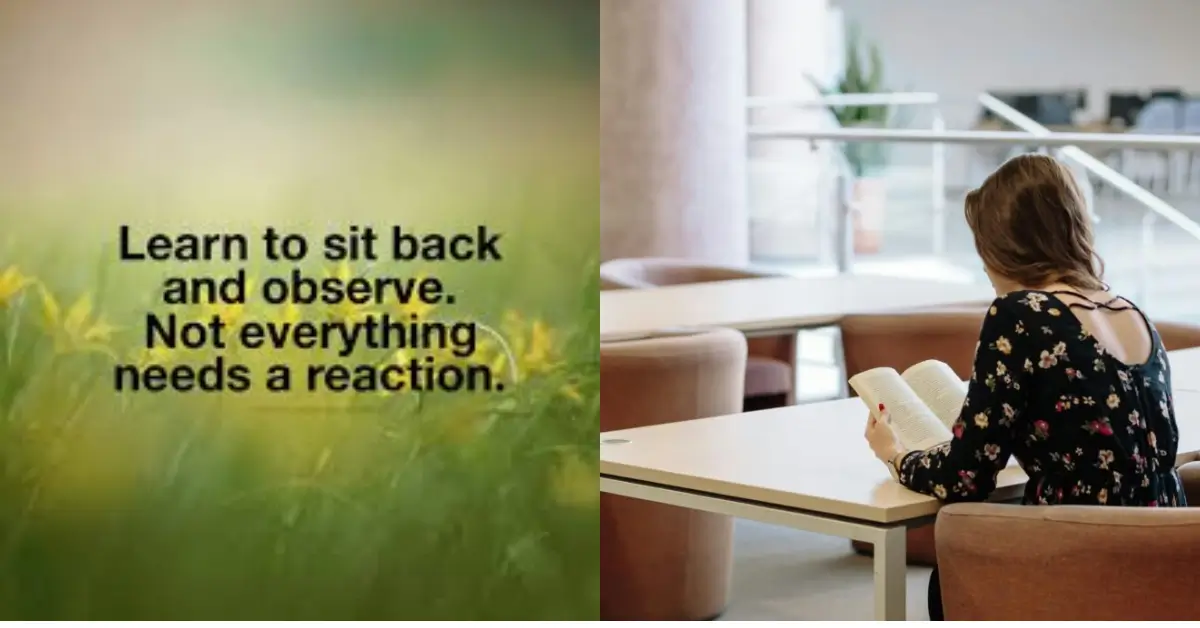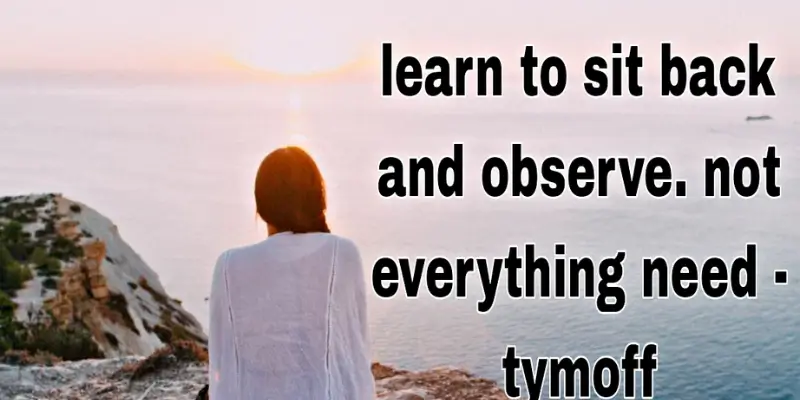Learn to Sit Back and Observe: Not Everything Needs – Tymoff Essential Wisdom & Mindful Living

In our fast-paced world, we often feel the need to react quickly, whether to a work email, a personal conflict, or even a passing thought. The quote, “Learn to sit back and observe: Not everything needs – Tymoff”, serves as a reminder of the value of pausing and reflecting before reacting.
This mindset promotes emotional intelligence and fosters healthier decision-making, encouraging us to embrace patience and mindfulness. By stepping back, we allow ourselves the opportunity to assess situations more thoughtfully and respond when necessary, with greater clarity and intention.
This approach aligns with mindfulness practices that are growing in popularity for their benefits on emotional and mental well-being. Let’s dive into why taking a moment to sit back and observe is crucial and how you can integrate it into your life for long-term benefits.
Learn to Sit Back and Observe: Not Everything Needs – Tymoff
In today’s society, reacting immediately is often seen as a sign of efficiency or competence. However, constant reactivity can lead to stress, poor decision-making, and strained relationships. By choosing observation over immediate reaction, you create space to think critically and make decisions that align with your true values.
Observation helps you avoid impulsive responses driven by stress triggers or emotions. This allows for more mindful reflection, ensuring that your actions are deliberate and thoughtful rather than hasty.
Emotional intelligence frameworks emphasize the significance of self-awareness, which can only develop through observation. This awareness helps identify when to act and when simply observing is the best course.

Benefits of Mindful Observation in Daily Life
Practicing mindful observation offers numerous benefits, both in personal and professional realms. It leads to emotional intelligence, allowing you to better understand and control your emotions while empathizing with others.
This can improve relationships and strengthen leadership abilities, as mindful leaders tend to make more strategic decisions. In daily life, sitting back and observing also reduces stress.
Mindfulness techniques like meditation practices and digital detoxes help in recognizing the early signs of stress and prevent reactive habits that can lead to burnout. By being aware of your surroundings and your internal state, you improve your overall well-being, experience greater clarity, and make choices that align with your long-term goals.
Read Also: AOPG Trello
How to Practice Sitting Back and Observing
Cultivating the habit of observation requires patience and consistency. Mindfulness meditation is one of the most effective techniques to develop this skill. Through meditation, you train your mind to focus on the present moment without the urge to react.
Even a few minutes a day can make a significant difference. Another helpful strategy is journaling. Writing down your thoughts and observations encourages self-reflection without the need to act on them immediately.
This simple practice enhances self-awareness and impulse control, key components of emotional intelligence. Additionally, incorporating nature observation into your routine can deepen your sense of connection to the world and promote mindfulness, offering a peaceful pause from life’s busyness.
The Role of Patience and Mindfulness
Patience is integral to learning how to sit back and observe. Our modern world thrives on speed, but patience helps us resist the urge for immediate gratification.
Patience and mindfulness work hand in hand, allowing us to pause, reflect, and observe without feeling rushed into action. Mindfulness practice is the cornerstone of this approach, training the mind to remain present and calm.
By focusing on mindful reflection, you can gain a better understanding of both your emotions and the dynamics of any given situation. This calm, measured approach leads to thoughtful decision-making, reducing the likelihood of regret caused by impulsive actions.

When Action is Necessary vs. When to Stay Observant
Not every situation requires immediate action. The wisdom lies in discerning when to act and when to remain observant. For example, in situations involving immediate safety concerns, taking swift action is crucial. Similarly, some time-sensitive opportunities demand quick responses.
However, even in these cases, a brief pause to observe the situation can lead to more effective decisions. In contrast, many moments in life, such as personal relationships or professional development, benefit more from quiet observation than immediate action.
Patience allows for strategic decision-making, enabling you to gather all necessary information before responding. Recognizing these moments and exercising restraint can lead to more meaningful, well-thought-out actions.
Challenges to Practicing Observation and How to Overcome Them
Implementing this practice is not always easy. One of the biggest challenges is overcoming the habit of reactive behavior.
Many of us are conditioned to respond instantly to stimuli, whether it’s a phone notification or a conversation. This constant reactivity can be hard to break. To counter this, digital detoxes can help you reclaim your attention and practice stress management techniques.
Taking small, intentional pauses throughout your day—such as before responding to an email or engaging in a meeting—can help you build the habit of observation. Over time, these practices reduce anxiety, allowing for more thoughtful and calm responses.
Long-Term Benefits of Mastering Observation
Mastering the art of observation offers significant long-term benefits. As you develop this skill, you’ll likely experience improved decision-making and enhanced empathy and understanding in your relationships.
In addition, you’ll find that your stress levels decrease as you no longer feel the need to react to everything immediately.
Observation also fosters personal growth. By regularly reflecting on your experiences, you gain insights into your strengths, weaknesses, and areas for improvement. This ongoing self-awareness encourages a growth mindset, where you view challenges as opportunities for development rather than stressors.

Balancing Observation and Action in Different Life Areas
In various aspects of life, balancing observation and action is key. In your professional life, for instance, learning to observe can lead to better strategic decision-making.
Instead of jumping into every task or conflict, you can take time to assess the situation, identify opportunities for improvement, and act more effectively. In your personal life, observation enhances relationships by allowing you to better understand and empathize with others.
It also helps you identify unhealthy patterns, both in your own behavior and in your interactions with others. When you’re able to recognize these patterns, you can address them more thoughtfully and strengthen your relationships.
Read Also: Sandra Orlow
Quick Facts
- Mindfulness practice improves emotional intelligence by fostering self-awareness.
- Mindful reflection allows for better decision-making and reduces stress.
- Impulse control is a key benefit of learning to sit back and observe.
- Practicing patience and mindfulness helps balance observation with action.
- Long-term benefits of observation include enhanced relationships, improved creativity, and reduced stress.
Final Thoughts
Learning to sit back and observe without the constant need for reaction is a powerful skill that can transform both your personal and professional life.
By integrating mindfulness practices and embracing patience, you gain greater emotional intelligence, make more thoughtful decisions, and improve your overall well-being. Tymoff’s message reminds us that not everything requires our immediate response—sometimes, the most powerful action is observation.
FAQs
What does “learn to sit back and observe” mean?
This phrase encourages mindfulness and patience, suggesting that not all situations require immediate action or reaction. By observing first, you make more thoughtful decisions.
How can mindfulness improve emotional intelligence?
Mindfulness helps you become more aware of your thoughts and emotions, allowing you to manage them better and empathize with others, which are key aspects of emotional intelligence.
What are some ways to practice observation in daily life?
You can practice observation through mindfulness meditation, journaling, and taking intentional pauses before reacting to situations.
How does observation reduce stress?
By observing rather than reacting impulsively, you reduce emotional reactivity, which can lower stress levels and lead to more calm, thoughtful responses.
When should I take action instead of just observing?
Take action in situations where there is an immediate safety concern, a time-sensitive opportunity, or an ethical imperative. In other situations, observation may be more beneficial before acting.





